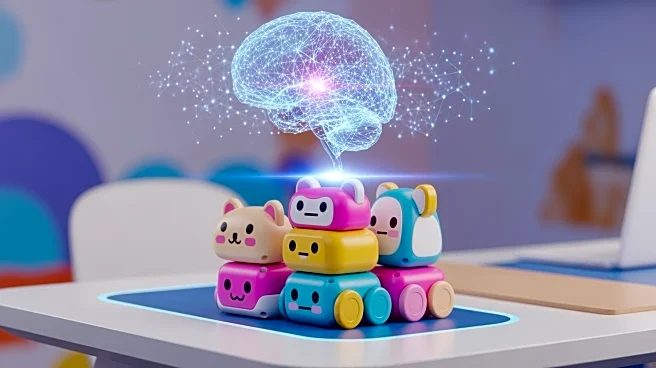What's Happening?
Major technology companies, including Microsoft, OpenAI, and Anthropic, are investing millions of dollars to train teachers in artificial intelligence (AI) literacy. This initiative is part of a partnership with the American Federation of Teachers (AFT),
the second-largest teachers union in the United States. The collaboration aims to equip educators with the skills necessary to integrate AI into their teaching methods, thereby preparing students for a future where AI plays a significant role. Microsoft has committed $12.5 million over five years, OpenAI is contributing $8 million along with $2 million in technical resources, and Anthropic has offered $500,000. The funds will be used to establish AI training hubs, starting in New York City, with plans to train 400,000 teachers over the next five years. The National Education Association (NEA), the largest teachers union, has also partnered with Microsoft to develop AI training programs for its members.
Why It's Important?
The integration of AI into educational settings is crucial as it represents a shift towards modernizing teaching methods and preparing students for a technology-driven future. By training teachers in AI, these initiatives aim to enhance educational outcomes and ensure that students are equipped with the necessary skills to navigate an increasingly digital world. The involvement of major tech companies highlights the growing importance of AI in education and the potential for these companies to influence educational practices. However, it also raises concerns about the role of private corporations in public education and the need for educators to maintain a critical perspective on the use of AI tools.
What's Next?
The partnership between teachers unions and tech companies is expected to expand, with plans to open additional AI training hubs and increase the number of trained educators. As AI becomes more integrated into classrooms, ongoing discussions about the ethical implications and potential impacts on teaching jobs will likely continue. Educators and policymakers will need to address concerns about privacy, data security, and the potential for AI to replace certain teaching functions. The Trump administration's creation of an AI Education Task Force indicates a governmental interest in promoting AI literacy, which may lead to further initiatives and funding opportunities.
Beyond the Headlines
The collaboration between teachers unions and tech companies could lead to long-term changes in educational practices, potentially influencing curriculum development and teaching strategies. The focus on AI literacy may also prompt discussions about the broader implications of AI in society, including its impact on employment and the economy. As AI tools become more prevalent in education, there may be increased scrutiny on the ethical use of technology and the need for regulations to ensure that AI is used responsibly and equitably.















